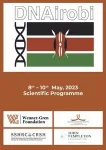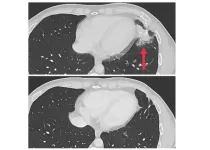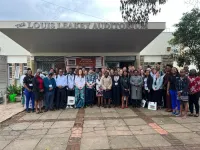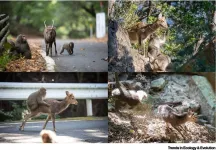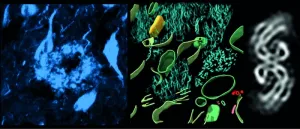(Press-News.org) New research from the University of Ottawa (uOttawa) has provided a complicated glance into young women’s responses to interpersonal conflict, with retaliation often the answer to rejection and perceived social exclusion by other females.
The study, published in Nature’s Scientific Reports, highlights the complicated nature of women’s interpersonal relationships by examining the stress arising from rejection, and if the personal characteristics of those imposing the rejection influences women’s social pain.
uOttawa professor Tracy Vaillancourt’s past research showed social status was afforded to young women based on attractiveness and cruelty (think ‘Mean Girls’). This made her wonder if being rejected by women with these features would hurt more than being rejected by women without these features. These questions led her to delve into the neurological and behavioral underpinnings of peer rejection.
The study provoked rejection in 87 young women via social exclusion using Cyberball, a virtual computer ball-tossing game in which participants play against pretend players. Electroencephalography (EEG) was used to assess social pain.
“Given that women who hold more power tend to be attractive and mean, we expected that women would be most hurt by being rejected by women with these attributes,” explains Vaillancourt, whose previous research in the field has focused on women’s interpersonal relationships.
What Vaillancourt and her team discovered was surprising.
“Contrary to our prediction, participants were most bothered by being rejected by unattractive unfriendly women,” says Vaillancourt, who offered this may have to do with participants being offended by being rejected by women they thought were less attractive than them. Although this finding was unexpected, the women’s retaliation against attractive women was expected. Specifically, women only debased their attractiveness ratings of pretty, mean women.
“It’s interesting that the participants did not like being rejected by the unattractive unfriendly women and yet they did not punish them for their exclusionary behavior. Rather, they went after the so-called alpha, lowering their attractiveness rating of her.” says Vaillancourt, professor from Counselling Psychology in the Faculty of Education, who is also a Canada Research Chair in School-Based Mental Health and Violence Prevention.
“The findings speak to the complexities of women’s interactions. Women are very sensitive to cues of social rejection, and this is sensitivity has kept us alive. The neural alarm of not belonging has encouraged our ancestors to cooperate and fit in. This is a good thing. The issue, however, is that women are far more sensitive to these cues than men and this causes them distress when they feel or anticipate being excluded.”
Vaillancourt adds the ubiquity of social exclusion as an aggression tactic used by women and its pointed emotional and physiological impact demands more research on this topic.
END
Women and social exclusion: The complicated nature of rejection and retaliation
New study from the University of Ottawa delves into complexities surrounding women’s interpersonal relationships
2024-07-11
ELSE PRESS RELEASES FROM THIS DATE:
Immunotherapy approach shows potential in some people with metastatic solid tumors
2024-07-11
Early findings from a small clinical trial provide evidence that a new cellular immunotherapy approach may be effective in treating metastatic solid tumors. In the trial, researchers from the National Institutes of Health (NIH) genetically engineered normal white blood cells, known as lymphocytes, from each patient to produce receptors that recognize and attack their specific cancer cells. These initial findings are from people with metastatic colorectal cancer who had already undergone multiple earlier treatments. The personalized immunotherapy shrank tumors in several patients and was able to keep the tumors from regrowing for up to seven months. ...
Neighborhood impact on children's well-being shifted during COVID-19 pandemic, ECHO study suggests
2024-07-11
The COVID-19 pandemic significantly disrupted daily life and has raised concerns about its impact on children’s well-being. A new study from the NIH Environmental influences on Child Health Outcomes Program (ECHO) sheds light on how a neighborhood’s physical and social environment influenced a child’s well-being before and during the pandemic.
According to an analysis of ECHO Cohort data, the neighborhood environment was less likely to be associated with child well-being during the ...
Neurobiologist Sung Soo Kim receives 2024 Scholar Award from McKnight Foundation
2024-07-11
(Santa Barbara, Calif.) — Birds migrating. Your cat, returning home from a day of roaming. Bees taking pollen to their hives. You, finding yourself back home without actually remembering the drive from work. Animal navigation is a fundamental behavior, so innate that most of the time we don’t notice that we’re doing it. And yet, so many times a day we (and the animals around us) unerringly find our ways to our target locations whether they be old haunts or new venues, from different directions and even in the dark.
How do we do it? That’s the question UC Santa Barbara neurobiologist Sung Soo Kim seeks to ...
Charting an equitable future for DNA and ancient DNA research in Africa
2024-07-11
CLEVELAND AND NAIROBI — July 11, 2024 — Today, the American Journal of Human Genetics published a perspective piece on the need for an equitable and inclusive future for DNA and ancient DNA (aDNA) research in Africa. The paper, coauthored by an international team of 36 scientists from Africa, North America, Asia, Australia, and Europe, was led by Dr. Elizabeth (Ebeth) Sawchuk of the Cleveland Museum of Natural History and Dr. Kendra Sirak of Harvard University.
DNA from ancient and living African peoples is critical for researchers studying our species’ evolution and population ...
Introducing co-cultures: When co-habiting animal species share culture
2024-07-11
Cooperative hunting, resource sharing, and using the same signals to communicate the same information—these are all examples of cultural sharing that have been observed between distinct animal species. In an opinion piece published June 19 in the journal Trends in Ecology & Evolution, researchers introduce the term “co-culture” to describe cultural sharing between animal species. These relationships are mutual and go beyond one species watching and mimicking another species’ behavior—in co-cultures, both species influence each other in substantial ways.
“Co-culture challenges the notion ...
Study finds health risks in switching ships from diesel to ammonia fuel
2024-07-11
As container ships the size of city blocks cross the oceans to deliver cargo, their huge diesel engines emit large quantities of air pollutants that drive climate change and have human health impacts. It has been estimated that maritime shipping accounts for almost 3 percent of global carbon dioxide emissions and the industry’s negative impacts on air quality cause about 100,000 premature deaths each year.
Decarbonizing shipping to reduce these detrimental effects is a goal of the International Maritime Organization, ...
Seeing inside Alzheimer’s disease brain
2024-07-11
Scientists investigating Alzheimer’s disease have determined the structure of molecules within a human brain for the very first time.
Published today in Nature, the study describes how scientists used cryo-electron tomography, guided by fluorescence microscopy, to explore deep inside an Alzheimer’s disease donor brain.
This gave 3-dimensional maps in which they could observe proteins, the molecular building blocks of life a million-times smaller than a grain of rice, within the brain.
The study zoomed in on two proteins that cause dementia– ‘β-amyloid’, a protein that forms microscopic ...
Nanoplastics and ‘forever chemicals’ disrupt molecular structures, functionality
2024-07-11
EL PASO, Texas (July 11, 2024) – Researchers at The University of Texas at El Paso have made significant inroads in understanding how nanoplastics and per- and polyfluoroalkyl substances (PFAS) — commonly known as forever chemicals — disrupt biomolecular structure and function. The work shows that the compounds can alter proteins found in human breast milk and infant formulas — potentially causing developmental issues downstream.
Nanoplastics and forever chemicals are manmade compounds present throughout the environment; a series of recent studies have linked them to numerous ...
Quadrupolar nuclei measured for the first time by zero-field NMR
2024-07-11
What is the structure of a particular molecule? And how do molecules interact with each other? Researchers interested in those questions frequently use nuclear magnetic resonance (NMR) spectroscopy to find answers. In NMR, a powerful external magnetic field is employed to align the spins of atomic nuclei, which are then induced to rotate by an oscillating weak magnetic field generated by coils. A change in voltage as a result can be converted to measurable frequencies. Based on this, researchers can identify the molecular structures while also revealing ...
UT Arlington research contributes $226 million to U.S. economy
2024-07-11
A new report shows that research projects at The University of Texas at Arlington contributed one quarter of a billion dollars—$226.4 million, to be exact—to the national economy through 797 vendor contracts and subcontracts between 2018 and 2022. Of those contracts, 111 were from small businesses and 87 from minority- or woman-owned businesses.
“Research coming from UT Arlington faculty and students not only helps solve some of society’s most vexing problems, but it is also an important economic driver for business development,” said Kate C. Miller, vice president for research and innovation at UTA. “This report makes clear that UTA research ...
LAST 30 PRESS RELEASES:
E-waste chemicals are appearing in dolphins and porpoises
Researchers warn: opioids aren’t effective for many acute pain conditions
Largest image of its kind shows hidden chemistry at the heart of the Milky Way
JBNU researchers review advances in pyrochlore oxide-based dielectric energy storage technology
Novel cellular phenomenon reveals how immune cells extract nuclear DNA from dying cells
Printable enzyme ink powers next-generation wearable biosensors
6 in 10 US women projected to have at least one type of cardiovascular disease by 2050
People’s gut bacteria worse in areas with higher social deprivation
Unique analysis shows air-con heat relief significantly worsens climate change
Keto diet may restore exercise benefits in people with high blood sugar
Manchester researchers challenge misleading language around plastic waste solutions
Vessel traffic alters behavior, stress and population trends of marine megafauna
Your car’s tire sensors could be used to track you
Research confirms that ocean warming causes an annual decline in fish biomass of up to 19.8%
Local water supply crucial to success of hydrogen initiative in Europe
New blood test score detects hidden alcohol-related liver disease
High risk of readmission and death among heart failure patients
Code for Earth launches 2026 climate and weather data challenges
Three women named Britain’s Brightest Young Scientists, each winning ‘unrestricted’ £100,000 Blavatnik Awards prize
Have abortion-related laws affected broader access to maternal health care?
Do muscles remember being weak?
Do certain circulating small non-coding RNAs affect longevity?
How well are international guidelines followed for certain medications for high-risk pregnancies?
New blood test signals who is most likely to live longer, study finds
Global gaps in use of two life-saving antenatal treatments for premature babies, reveals worldwide analysis
Bug beats: caterpillars use complex rhythms to communicate with ants
High-risk patients account for 80% of post-surgery deaths
Celebrity dolphin of Venice doesn’t need special protection – except from humans
Tulane study reveals key differences in long-term brain effects of COVID-19 and flu
The long standing commercialization challenge of lithium batteries, often called the dream battery, has been solved.
[Press-News.org] Women and social exclusion: The complicated nature of rejection and retaliationNew study from the University of Ottawa delves into complexities surrounding women’s interpersonal relationships

